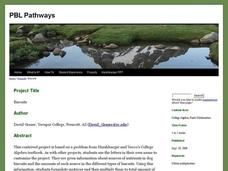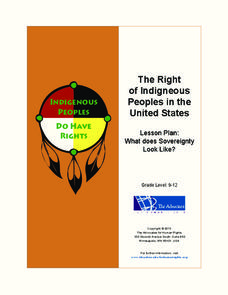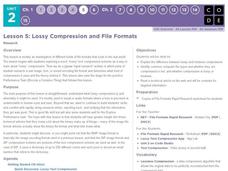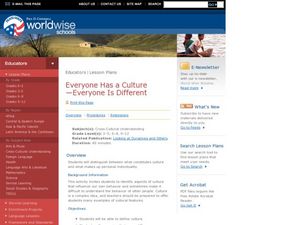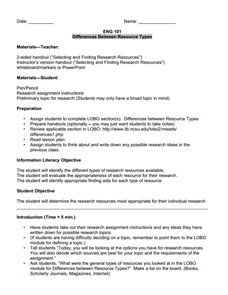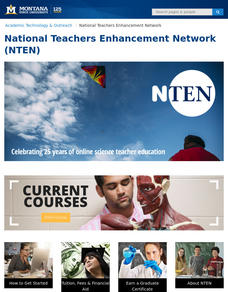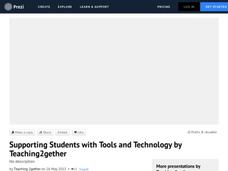PBL Pathways
Biscuits
Calculate the nutrients in different types of dog biscuits. Pupils create a technical report outlining the amount of calcium, protein, and carbohydrates in three types of dog biscuits. The project-based learning activity requires...
Teach Engineering
Household Energy Audit
Do you have an energy hog in your home? Individuals pick at least one room at home to determine the amount of energy the appliances consume. Using that information, pupils fill out a worksheet to determine the cost of running each...
Advocates for Human Rights
The Right of Indigneous Peoples in the United States
The sovereignty of U.S. Native American nations is the focus of a resource that asks class members to compare the Right to Self-Determination in the UN Declaration on the Rights of Indigenous Peoples with a fact sheet that details the...
Penguin Books
A Teacher’s Guide to the Signet Classics Edition of Mary Shelley ’s Frankenstein
Contrary to popular belief, the monster's name in Mary Shelley's Frankenstein is not Frankenstein. A teacher's guide for the novel helps readers make sense of key details in the text, define vocabulary words, and discuss prominent...
Aquarium of the Pacific
Lego Molecules
Young scientists construct an understanding of molecular compounds in this hands-on science lesson. Using LEGO® to model the atoms of different elements, students build molecules based on the chemical formulas of common compounds.
Chicago Botanic Garden
What Can Tree Rings Tell Us About Climate?
Tree rings are slightly thicker on the south side of the tree because it receives more sunlight. Part two in a series of five lessons helps learners analyze tree rings to determine the environmental conditions that caused size...
National Science Teachers Association
Hop into Action
Young scientists find out what makes amphibians such unique and interesting animals in this simple life science lesson. After looking at pictures and discussing the characteristics of amphibians, learners complete a series of three Venn...
Balanced Assessment
Cost of Living
Math scholars investigate the cost of living in Hong Kong compared to Chicago but must first convert the different types of currency. They then choose a type of graph to compare different spending categories and finish the activity by...
Curriculum Corner
It's Been a Wildly Exciting Year!
Take time at the end of the year to celebrate the amazing qualities and achievements of your learners with these printable awards. Offering a list of dozens of ways to recognize the individuals in your class, this resource is a great way...
Code.org
Lossy Compression and File Formats
I'm compressed. Groups do a rapid research of different file types to determine what kind of compression the formats use and how it works. They share their information with the rest of the class until everyone has all the information for...
Houghton Mifflin Harcourt
Family and Friends: Extra Support Lessons (Theme 4)
Family and Friends is the theme of a unit offering extra support lessons. Follow each lesson plan's teach, blend, guided practice or practice/apply routine to reinforce concepts such as clusters, responding to reading, drawing...
Curated OER
DNA and Individual Differences
Middle schoolers list differences between DNA-related terms and create a simple DNA circle map. They order terms including human body, organ, tissue, cell, nucleus, etc. from largest to smallest. They discuss differences and...
Curated OER
Respecting Differences
Fifth graders brainstorm what a relationship looks like in which both people respect each other. After completing a worksheet, they discuss the importance of respecting other beliefs. To end the lesson, they identify things they can do...
Curated OER
Labeling
Students identify ways they label people and the affect those labels have on individuals. They identify their individual differences and share with the class their individuality. They explain how self-concept is built and preserved and...
Curated OER
Everyone has a Culture-Everyone is Different
Learners explore cultural features. In this multicultural acceptance instructional activity, students define and discuss "culture," and distinguish the difference between individual characteristics and cultural characteristics. ...
Curated OER
Individuality: India Arie Music Video
Students examine individuality. In this music video lesson, students listen to music by India Arie to determine how music shapes our ideas of what normal is as well as how music is a form of poetry. Activities are related to Stargirl.
Curated OER
Differences Between Resource Types
Google it! Like Kleenix, Google has genericized. But when beginning a project, young researchers need to go beyond search engines and become aware of the different types of research resources available. Introduce the options with a...
Curated OER
Discovering Differences Between Internet Search Engines
Students explore the differences in search engines available on the Internet. Most users are unaware of the differences between search engines. Some sample larger or smaller portions of the World Wide Web than others.
Colorado State University
How Can You Demonstrate the Different Efficiencies of Different Light Bulbs?
Need a bright idea for an engaging lab? Watch your class light up as they explore the difference in efficiency between incandescent and LED bulbs! The resource makes use of simple materials and encourages learners to infer what's...
Teacher Web
Archaebacteria and Eubacteria
Take young biologists back to the beginning of life on Earth with this presentation on bacteria. Examining the different classifications of bacteria, this presentation introduces young scientists to the concepts of autotrophs and...
EngageNY
Dilations from Different Centers
Can you follow a composition of transformations, or better yet construct them? Young mathematicians analyze the composition of dilations, examining both the scale factor and centers of dilations. They discover relationships for both and...
American Press Institute
Newspapers in Your Life: What’s News Where?
Big news isn't necessarily newsworthy everywhere! How do journalists decide what to cover with so much happening around them? A instructional activity on media literacy examines the factors that affect the media's choice of stories to...
Teaching2gether
Supporting Students with Tools and Technology by Teaching2gether
Here is a fantastic Prezi presentation designed for teachers on assistive technology for the classroom! Whether you are a student teacher or seasoned veteran, you will benefit from learning about different types of adaptive tools to...
National Park Service
Same Colors, Different Flavors
Who says getting to know your neighbors has to be difficult? The first resource in a three-part series creates an engaging project that teaches your scholars about Canadian culture. A question-and-answer format takes place via e-mail and...


